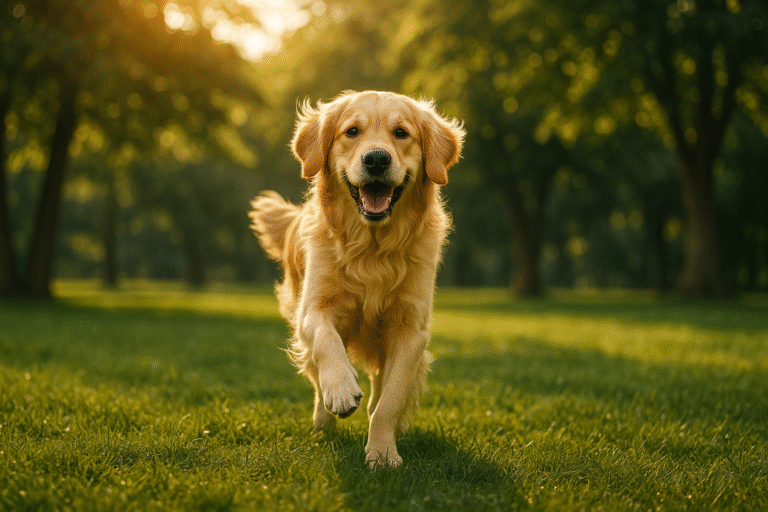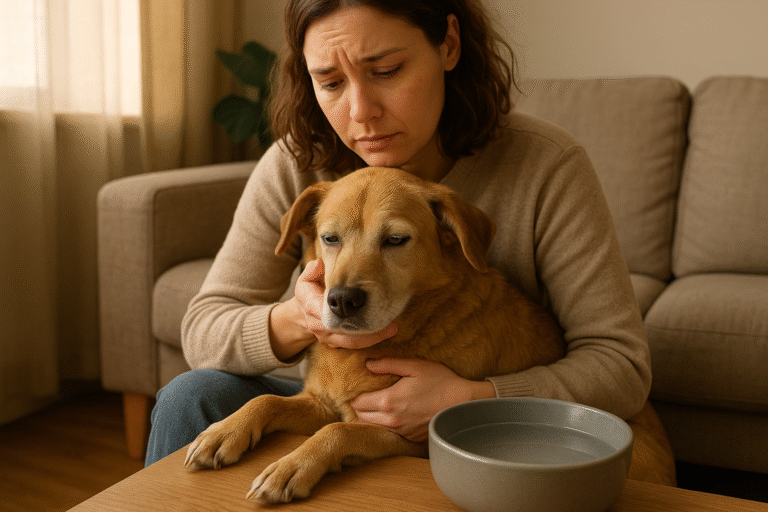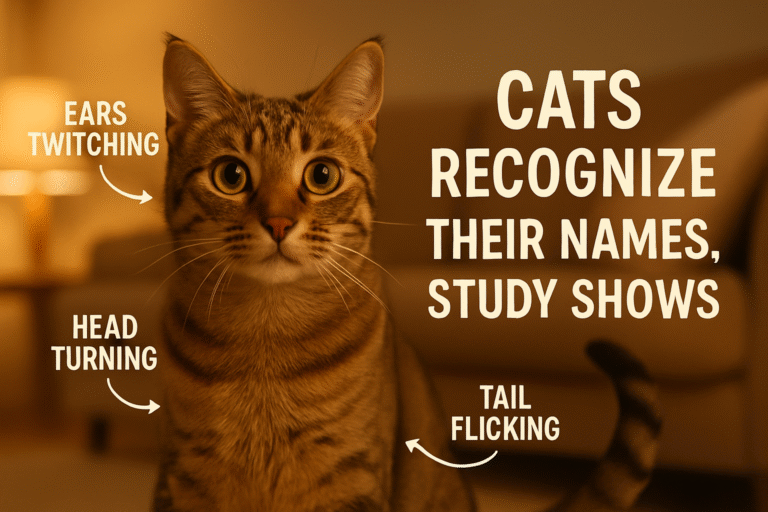Golden Retrievers and Labrador Retrievers are two of the most popular and family-friendly breeds worldwide. Both originated as sporting retrievers (hunting companions) and share a friendly, trainable nature. In fact, the Labrador has been the AKC’s most popular breed for decades, with Goldens ranking high as well.
Table of Contents
ToggleDespite their similarities—medium-large size, double coats, and eager-to-please temperaments—subtle differences in personality, grooming, and health mean one may fit your home better than the other. In this retriever comparison, we’ll introduce both breeds and break down how they differ in dog personality, grooming requirements, health issues, exercise needs, training styles, and costs.
By the end, you’ll have a clear picture of which breed best complements your family’s lifestyle.
Temperament and Personality Traits Compared
Both Golden Retrievers and Labrador Retrievers are renowned for their friendly, gentle dispositions. They are highly trainable, sociable, and excellent with people and other dogs. AKC experts note that “the hallmarks of both breeds are their kind nature with all humans… tolerant, loving, gentle, and unusually empathic.”
However, there are distinct personality differences:
🐾 Energy and Playfulness
Labradors are famously energetic and maintain their puppy-like enthusiasm well into adulthood. They thrive on active play, fetch, swimming, and exercise.
Goldens are playful too but slightly more relaxed and patient. They enjoy family games but are quicker to settle and more content to cuddle after playtime.
🐾 Sensitivity vs Boldness
Golden Retrievers are deeply emotionally sensitive. They often read human emotions well and act accordingly, showing empathy and caution.
Labrador Retrievers tend to be bold and adventurous. They may act first and think later—diving into new experiences without hesitation.
🐾 Trainability and Focus
Both breeds are highly trainable, but Goldens are generally more methodical and patient with repetition.
Labs respond well to exciting and fast-paced training but may lose focus if bored. Without stimulation, they can become mischievous.
🐾 Affection Level
Goldens are true “velcro dogs,” wanting to stay near you constantly.
Labs are also affectionate but can be more independent. They show love with less clinginess.
Summary:
Choose a Golden Retriever if you want a calm, sensitive, loyal family companion. Choose a Labrador Retriever if you love high energy, boldness, and fun-loving antics.
Grooming and Coat Maintenance
Both breeds are double-coated and shed year-round. However, coat length and texture differ:
| Feature | Golden Retriever | Labrador Retriever |
|---|---|---|
| Coat Type | Long, dense, with feathering on tail and legs | Short, dense, with water-resistant oily undercoat |
| Shedding | Moderate year-round + 2 heavy seasonal sheds | Heavy twice a year + moderate shedding daily |
| Brushing Frequency | 3–4 times/week (daily in shedding season) | Once a week (more in shedding season) |
| Bathing Needs | Once every few months or as needed | Same as Goldens |
| Ear Cleaning | Every 1–2 weeks (Goldens prone to allergy-related ear issues) | More prone to infections due to swimming habits |
| Grooming Time | Higher—requires brushing feathered areas | Lower—simple brushing with mitt or slicker brush |
| Professional Grooming | Often needed for trimming feathering and sanitary areas | Rarely needed; occasional bath and nail trim suffice |
Summary:
If grooming time is a concern, a Labrador will be easier to maintain. Goldens require frequent brushing and trimming to manage their long coat.
Exercise and Activity Requirements
🐕 Daily Needs
Both breeds are high-energy working dogs and need at least 60–90 minutes of activity daily. Without sufficient exercise, they may become restless, overweight, or destructive.
| Activity Type | Golden Retriever | Labrador Retriever |
|---|---|---|
| Walking | Enjoys long, brisk walks | Needs long walks or runs; high endurance |
| Swimming | Enjoys swimming, especially in summer | LOVES water—swimming is a natural strength |
| Fetch & Play | Enthusiastic, but calmer about fetch | Very driven by games like fetch or frisbee |
| Mental Games | Enjoys puzzles and scent games | Needs mentally stimulating tasks to avoid boredom |
🧠 Stimulation
Both breeds are intelligent and need mental enrichment:
Use puzzle toys, treat dispensers, and basic obedience routines.
Labradors especially benefit from advanced training, scent work, or agility sports.
Summary:
Labradors may require more intense daily exercise, while Goldens are happy with a moderate activity level. Both thrive in active homes.
Health Issues by Breed
Like most purebred dogs, both breeds are predisposed to certain health issues:
Health Issue | Golden Retriever | Labrador Retriever |
|---|---|---|
| Hip/Elbow Dysplasia | Common, especially in older dogs | Very common; obesity worsens risk |
| Cancer | Extremely high risk (~60% mortality from cancer) | Lower cancer rates, but still a concern |
| Obesity | Moderate risk | High risk; Labs love food |
| Ear Infections | Moderate; allergy-related | Very common due to water activity |
| Eye Problems | Cataracts, pigmentary uveitis | Progressive retinal atrophy, cataracts, entropion |
| Bloat (GDV) | At risk due to deep chests | At risk as well |
| Hypothyroidism | Relatively common | Also present, along with EIC (Exercise-Induced Collapse) |
| Allergies/Skin Issues | Prone to skin allergies, hot spots | Less allergy-prone |
Vet Tip: Always screen the breeder’s health records. Reputable breeders test for hip dysplasia, eye problems, and genetic diseases.
Cost of Ownership
💵 Initial Costs
| Expense | Golden Retriever | Labrador Retriever |
|---|---|---|
| Puppy Price | $1,000 – $3,000 (depends on breeder quality) | $800 – $2,500 |
| Initial Supplies | $300 – $500 | Same |
| Spay/Neuter Surgery | $200 – $500 | Same |
💰 Ongoing Costs
| Expense | Monthly Cost (Estimate) |
|---|---|
| Food | $50 – $80 |
| Grooming (DIY or Pro) | Goldens: $50–$100 (more frequent) / Labs: $30–$60 |
| Vet Visits | $500 – $1,000 annually (routine + emergencies) |
| Training Classes | $100 – $300 (optional) |
| Pet Insurance | $30 – $70/month |
| Miscellaneous (toys, treats, etc.) | $20 – $40/month |
Summary:
Golden Retrievers can be more expensive to groom, while Labs may cost more in food and vet bills due to obesity-related issues.
Training and Socialization
Both breeds are highly trainable but have slightly different learning styles:
✅ Golden Retriever
Responds well to repetition and praise.
Very intuitive about owners’ mood and tone.
Tends to excel in therapy dog and emotional support roles.
✅ Labrador Retriever
Learns quickly but needs short, exciting sessions.
Great for fieldwork, agility, service work, and even search-and-rescue.
Food-motivated, which helps in training—but requires portion control.
Socialization from a young age is key for both breeds. Introduce them to:
People of all ages
Other pets
Different environments and sounds
Summary:
If you want a calm and consistent learner, go with a Golden. If you enjoy active and dynamic training, Labs are a better fit.
Which Breed Is Best for Families with Kids?
Both Goldens and Labs are famous for being gentle, patient, and safe around children. They’re loyal protectors and affectionate playmates. However:
Golden Retrievers may be better for younger children or quieter homes due to their calm and nurturing nature.
Labradors are great for energetic families with older kids who love outdoor games and adventure.
Neither dog should be left unsupervised with very young kids, but both make wonderful additions to a well-managed household.
Final Verdict: Golden Retriever vs Labrador Retriever
| Category | Best Breed |
|---|---|
| Lower Grooming Needs | Labrador Retriever |
| Calm Temperament | Golden Retriever |
| Adventure & Play | Labrador Retriever |
| Emotional Sensitivity | Golden Retriever |
| Training Versatility | Labrador Retriever |
| Family Bonding | Both |
✅ Choose a Golden Retriever if you want:
A sensitive, gentle companion
A dog that thrives on emotional connection
A slightly calmer demeanor
A loyal dog who loves affection
✅ Choose a Labrador Retriever if you want:
A playful, bold best friend
A tireless outdoor partner
A slightly more independent dog
High adaptability to training
Conclusion
Both Golden Retrievers and Labrador Retrievers are loving, devoted, and friendly family dogs. They’re ideal for active households that can provide exercise, attention, and affection. The right choice depends on your family’s energy level, lifestyle, and grooming preferences.
Whichever you choose, you’ll gain a loyal companion who brings years of joy and love.
Frequently Asked Questions (FAQs)
1. Which is better for families with young children: Golden Retriever or Labrador Retriever?
Both breeds are excellent with children, but Golden Retrievers are slightly calmer and more nurturing, making them ideal for families with toddlers or young kids. Labs are more energetic and may accidentally knock over small children during play.v
2. Do Golden Retrievers or Labradors shed more?
Both breeds shed, but Golden Retrievers shed more visibly due to their longer coats and feathering. Labradors also shed heavily, especially during seasonal changes, but their short fur is easier to manage.
3. Which dog is easier to train: a Labrador or a Golden Retriever?
Both breeds are very trainable, but Labradors respond faster to energetic, food-based training, while Golden Retrievers prefer calm, consistent routines and respond well to praise.
4. Are Golden Retrievers more affectionate than Labrador Retrievers?
Golden Retrievers tend to be more emotionally sensitive and clingy, often called “velcro dogs.” Labradors are also affectionate but slightly more independent in nature.
5. Which breed is healthier overall: Labrador or Golden Retriever?
Labradors are generally healthier, though they are prone to obesity. Golden Retrievers have a higher risk of cancer and allergy-related issues. Responsible breeding is crucial for both.
6. Do Labradors or Golden Retrievers need more exercise?6. Do Labradors or Golden Retrievers need more exercise?
Labradors typically need more intense physical exercise and thrive in active households. Goldens also need daily activity but are more content with moderate play and walks.
7. Are Golden Retrievers more high maintenance than Labradors?
Yes. Golden Retrievers require more grooming, especially brushing and trimming, due to their long, feathery coats. Labradors have a short, water-resistant coat that is easier to maintain.
8. Which dog is more suitable for apartment living?
While neither is ideal for small spaces, Golden Retrievers adapt better to apartment life due to their calmer demeanor—as long as they get regular walks and stimulation.
9. Do Labradors or Golden Retrievers bark more?
Both breeds are not excessive barkers, but Labradors may bark more out of excitement or boredom. Golden Retrievers are generally more reserved and bark less frequently.
10. Which breed is more affordable to maintain?
Labradors are usually more affordable, especially in grooming. However, they may incur higher vet costs if obesity-related issues develop. Goldens can be more expensive due to professional grooming and genetic health screenings.
Related Topics
Copyright © 2025 The Pet Blog – Expert Tips, Care Guides & Fun Facts for Every Pet Lover.










